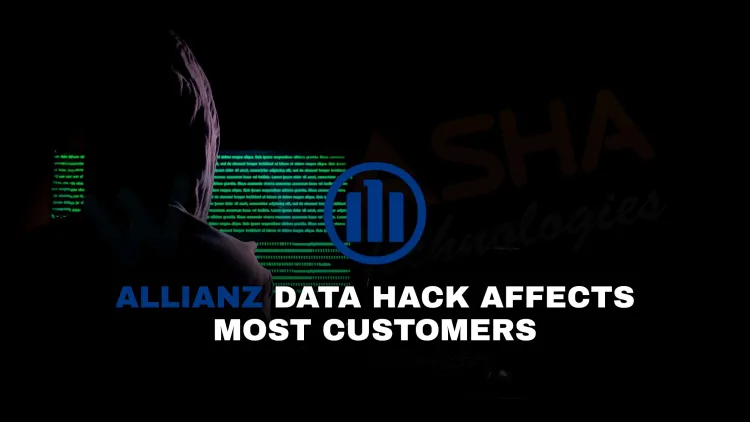What happened in the Allianz Life Insurance data breach and how many customers were affected?
On July 16, 2025, Allianz Life Insurance Company suffered a major data breach affecting personal data of approximately 1.4 million customers. The breach was caused by a sophisticated social engineering attack that targeted a third-party cloud-based CRM platform. The hackers successfully compromised customer information, prompting immediate response efforts and federal investigations.

Table of Contents
- How Was the Breach Discovered?
- What Kind of Data Was Compromised?
- Who Is Behind the Attack?
- What Is Social Engineering and Why Is It So Dangerous?
- Allianz’s Response to the Breach
- How Does This Reflect the Growing Threat to Insurance Companies?
- Real-World Impact: What Could Happen to the Victims?
- What Can Be Done Moving Forward?
- Conclusion
- Frequently Asked Questions (FAQs)
On July 16, 2025, Allianz Life Insurance—a major U.S. insurer—was the target of a sophisticated cyberattack that compromised the personal information of approximately 1.4 million customers. The breach, officially disclosed in a filing with the Maine Attorney General’s Office, revealed that a third-party cloud-based CRM system used by the company was exploited via social engineering techniques.
While many attacks exploit vulnerabilities in software or misconfigurations, this one highlights a growing threat: the human factor. Hackers targeted employees, tricked them into revealing access credentials, and gained unauthorized entry to the insurer’s sensitive customer database.
How Was the Breach Discovered?
The attack occurred on July 16, and was detected just one day later. Immediate containment efforts were launched, and the Federal Bureau of Investigation (FBI) was notified. According to Allianz spokesperson Brett Weinberg, the affected system was isolated, and investigators were mobilized to assess the damage.
Although the attackers accessed customer information, Allianz Life confirmed that critical policy systems were not compromised, ensuring that core insurance operations remained intact.
What Kind of Data Was Compromised?
The attackers gained access to personally identifiable information (PII), including data belonging to:
-
Customers
-
Financial professionals
-
Allianz Life employees
This could include names, contact information, policy numbers, and possibly social security or financial data—though the full extent is still under investigation.
Who Is Behind the Attack?
The Allianz breach fits a disturbing pattern seen across the insurance industry in 2025. Experts believe that a notorious hacking group known as Scattered Spider (also known as UNC3944 or Octo Tempest) is responsible.
Who Are Scattered Spider?
-
Composed largely of teenagers and young adults from the U.S. and U.K.
-
Previously attacked MGM Resorts, Caesars Entertainment, and Marks & Spencer
-
Use social engineering to manipulate employees into resetting credentials or granting access
-
Now actively targeting insurance providers due to the rich data they store
What Is Social Engineering and Why Is It So Dangerous?
Unlike traditional cyberattacks that exploit technical vulnerabilities, social engineering targets people. Attackers impersonate trusted figures—IT staff, executives, or even coworkers—and trick employees into providing sensitive data or access.
In this case, the hackers reportedly called help desks, posed as employees, and convinced staff to reset login credentials—bypassing technical safeguards like firewalls and antivirus tools.
Allianz’s Response to the Breach
Allianz Life stated that they took swift action:
-
Isolated the compromised system
-
Informed the FBI and federal authorities
-
Launched a third-party forensic investigation
-
Will begin customer notifications on August 1, 2025, as required by Maine’s data breach law
Additionally, Allianz emphasized that no other internal systems were affected, and there’s no current evidence of misuse of the exposed data.
How Does This Reflect the Growing Threat to Insurance Companies?
The breach is just one in a string of cyberattacks that have plagued U.S. insurers in 2025. As insurers increasingly rely on digital platforms and cloud services to manage customer information, they have become prime targets for cybercriminals.
With the cyber insurance market estimated to hit $16.3 billion in 2025, attackers are now seeing insurance providers as high-value targets due to the vast troves of sensitive, financial, and personal data they hold.
Real-World Impact: What Could Happen to the Victims?
Victims of data breaches like this one could face:
-
Identity theft
-
Fraudulent insurance claims
-
Phishing attacks using stolen details
-
Long-term financial damage
Such incidents also erode public trust in companies responsible for safeguarding life savings and personal security.
What Can Be Done Moving Forward?
The Allianz breach is a wake-up call for the insurance industry and all organizations handling sensitive data. Recommended steps include:
-
Stronger employee training on social engineering
-
Zero-trust architecture and identity verification for help desks
-
Regular third-party audits of cloud systems
-
Incident response simulations to reduce reaction time
Conclusion
The Allianz Life Insurance data breach, which affected nearly 1.4 million customers, is a stark reminder of the evolving cyber threat landscape in 2025. While firewalls and encryption remain essential, attackers are increasingly bypassing them by targeting human vulnerabilities.
As threat actors like Scattered Spider grow more aggressive and organized, industries like insurance—which deal with life-altering data—must prioritize proactive defense, employee awareness, and resilient security architecture. For Allianz and others, this breach may be just the beginning of a new chapter in cyber risk management.
FAQs
What caused the Allianz Life Insurance data breach in July 2025?
The breach was caused by a social engineering attack targeting a third-party cloud-based CRM platform used by Allianz Life.
How many customers were affected by the Allianz data breach?
The personal information of around 1.4 million customers was exposed in the breach.
What type of data was compromised in the Allianz Life breach?
Personally identifiable information (PII) of customers, financial professionals, and select employees was compromised.
When did the Allianz Life Insurance breach occur?
The breach occurred on July 16, 2025, and was discovered the next day.
Was the Allianz policy administration system affected?
No, the investigation found no evidence that Allianz’s core policy administration system was compromised.
Who is suspected to be behind the attack?
The hacking group Scattered Spider (also known as UNC3944 or Octo Tempest) is suspected due to their recent attacks on the insurance industry.
What is social engineering in cybersecurity?
Social engineering is a tactic used to manipulate individuals into giving up confidential information or access by pretending to be a trusted entity.
How did the hackers gain access to Allianz Life systems?
They used social engineering techniques, such as impersonating staff and tricking help desks into granting access.
Did Allianz notify customers about the breach?
Yes, under Maine law, Allianz is required to notify all affected individuals within 30 days and plans to do so by August 1, 2025.
Is the Allianz Life data breach being investigated by authorities?
Yes, Allianz notified the FBI and is cooperating with federal investigators to assess the full impact.
What CRM system was compromised in this breach?
The exact third-party CRM system name hasn’t been disclosed in public reports.
Was any financial information exposed in the Allianz hack?
The exact nature of the exposed data has not been fully disclosed, but it includes sensitive personal information.
What can customers do to protect themselves after the Allianz breach?
Monitor accounts for suspicious activity, change passwords, and watch for phishing attempts.
How does this breach affect Allianz SE globally?
It’s a major incident for its U.S. subsidiary, potentially impacting brand trust, though Allianz SE operates in 125+ countries.
Are there other insurance companies that faced similar attacks in 2025?
Yes, several U.S. insurance firms have been targeted this year by similar social engineering campaigns.
How can companies defend against social engineering attacks?
Implement multi-factor authentication, employee training, strict verification procedures, and regular security audits.
Why are insurance companies attractive to hackers?
They store large volumes of sensitive data, including PII and financial records, making them high-value targets.
What is Scattered Spider known for?
Scattered Spider is known for social engineering attacks against major corporations, including MGM Resorts and Caesars.
What is the estimated value of the cyber insurance market in 2025?
The market is valued at approximately $16.3 billion in 2025.
Will Allianz Life offer credit monitoring for affected users?
The company has not officially confirmed this yet, but it’s a common practice following breaches of this nature.
What is Allianz Life’s parent company?
Allianz Life is a subsidiary of German financial powerhouse Allianz SE.
Has Allianz SE had previous cyber incidents?
There are no recent major incidents reported publicly before this attack involving Allianz SE.
How soon was the breach detected?
It was discovered the day after the attack occurred, on July 17, 2025.
Is Allianz Life legally required to disclose this breach?
Yes, under data protection laws like Maine’s breach notification law, they must notify affected individuals.
What lessons can other companies learn from this breach?
The importance of securing third-party integrations, training staff, and preparing incident response plans.
What is a third-party cloud-based CRM system?
It’s a customer relationship management platform hosted on the cloud by an external service provider.
Did the breach affect only customers in Maine?
No, the breach likely affects customers across the U.S., though the disclosure was filed with Maine’s attorney general.
Are attackers increasingly using social engineering?
Yes, attackers favor these methods due to their high success rates against human targets.
What steps did Allianz take immediately after discovering the breach?
They notified law enforcement, began containment, and launched a full investigation.
Is customer data secure now?
Allianz Life claims they’ve taken steps to contain the incident, but investigations are ongoing.
Will there be legal consequences for Allianz Life?
This depends on the investigation outcome and whether any compliance failures are identified.














![Top 10 Ethical Hackers in the World [2025]](https://www.webasha.com/blog/uploads/images/202408/image_100x75_66c2f983c207b.webp)








